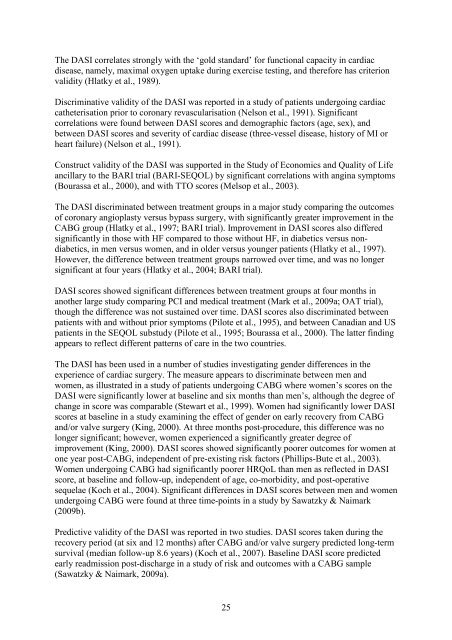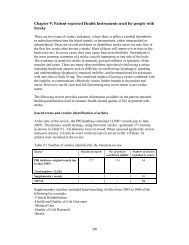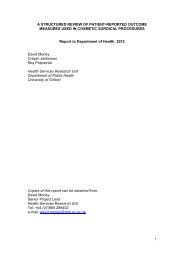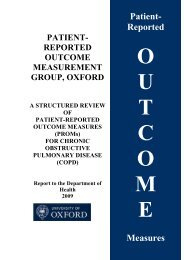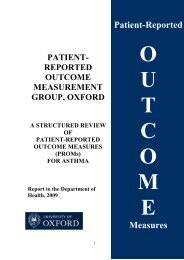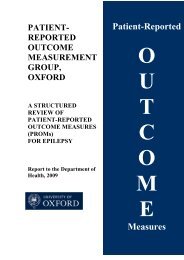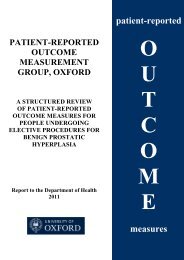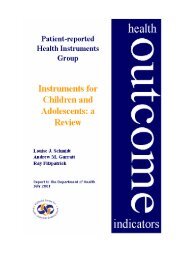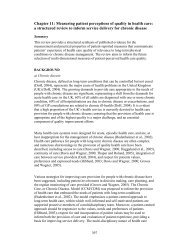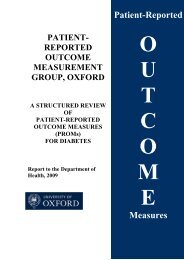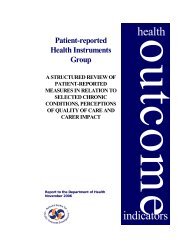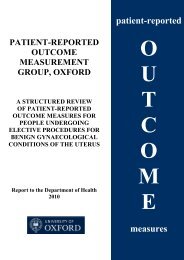2010 review - Patient-Reported Outcomes Measurement - University ...
2010 review - Patient-Reported Outcomes Measurement - University ...
2010 review - Patient-Reported Outcomes Measurement - University ...
Create successful ePaper yourself
Turn your PDF publications into a flip-book with our unique Google optimized e-Paper software.
The DASI correlates strongly with the ‘gold standard’ for functional capacity in cardiac<br />
disease, namely, maximal oxygen uptake during exercise testing, and therefore has criterion<br />
validity (Hlatky et al., 1989).<br />
Discriminative validity of the DASI was reported in a study of patients undergoing cardiac<br />
catheterisation prior to coronary revascularisation (Nelson et al., 1991). Significant<br />
correlations were found between DASI scores and demographic factors (age, sex), and<br />
between DASI scores and severity of cardiac disease (three-vessel disease, history of MI or<br />
heart failure) (Nelson et al., 1991).<br />
Construct validity of the DASI was supported in the Study of Economics and Quality of Life<br />
ancillary to the BARI trial (BARI-SEQOL) by significant correlations with angina symptoms<br />
(Bourassa et al., 2000), and with TTO scores (Melsop et al., 2003).<br />
The DASI discriminated between treatment groups in a major study comparing the outcomes<br />
of coronary angioplasty versus bypass surgery, with significantly greater improvement in the<br />
CABG group (Hlatky et al., 1997; BARI trial). Improvement in DASI scores also differed<br />
significantly in those with HF compared to those without HF, in diabetics versus nondiabetics,<br />
in men versus women, and in older versus younger patients (Hlatky et al., 1997).<br />
However, the difference between treatment groups narrowed over time, and was no longer<br />
significant at four years (Hlatky et al., 2004; BARI trial).<br />
DASI scores showed significant differences between treatment groups at four months in<br />
another large study comparing PCI and medical treatment (Mark et al., 2009a; OAT trial),<br />
though the difference was not sustained over time. DASI scores also discriminated between<br />
patients with and without prior symptoms (Pilote et al., 1995), and between Canadian and US<br />
patients in the SEQOL substudy (Pilote et al., 1995; Bourassa et al., 2000). The latter finding<br />
appears to reflect different patterns of care in the two countries.<br />
The DASI has been used in a number of studies investigating gender differences in the<br />
experience of cardiac surgery. The measure appears to discriminate between men and<br />
women, as illustrated in a study of patients undergoing CABG where women’s scores on the<br />
DASI were significantly lower at baseline and six months than men’s, although the degree of<br />
change in score was comparable (Stewart et al., 1999). Women had significantly lower DASI<br />
scores at baseline in a study examining the effect of gender on early recovery from CABG<br />
and/or valve surgery (King, 2000). At three months post-procedure, this difference was no<br />
longer significant; however, women experienced a significantly greater degree of<br />
improvement (King, 2000). DASI scores showed significantly poorer outcomes for women at<br />
one year post-CABG, independent of pre-existing risk factors (Phillips-Bute et al., 2003).<br />
Women undergoing CABG had significantly poorer HRQoL than men as reflected in DASI<br />
score, at baseline and follow-up, independent of age, co-morbidity, and post-operative<br />
sequelae (Koch et al., 2004). Significant differences in DASI scores between men and women<br />
undergoing CABG were found at three time-points in a study by Sawatzky & Naimark<br />
(2009b).<br />
Predictive validity of the DASI was reported in two studies. DASI scores taken during the<br />
recovery period (at six and 12 months) after CABG and/or valve surgery predicted long-term<br />
survival (median follow-up 8.6 years) (Koch et al., 2007). Baseline DASI score predicted<br />
early readmission post-discharge in a study of risk and outcomes with a CABG sample<br />
(Sawatzky & Naimark, 2009a).<br />
25


